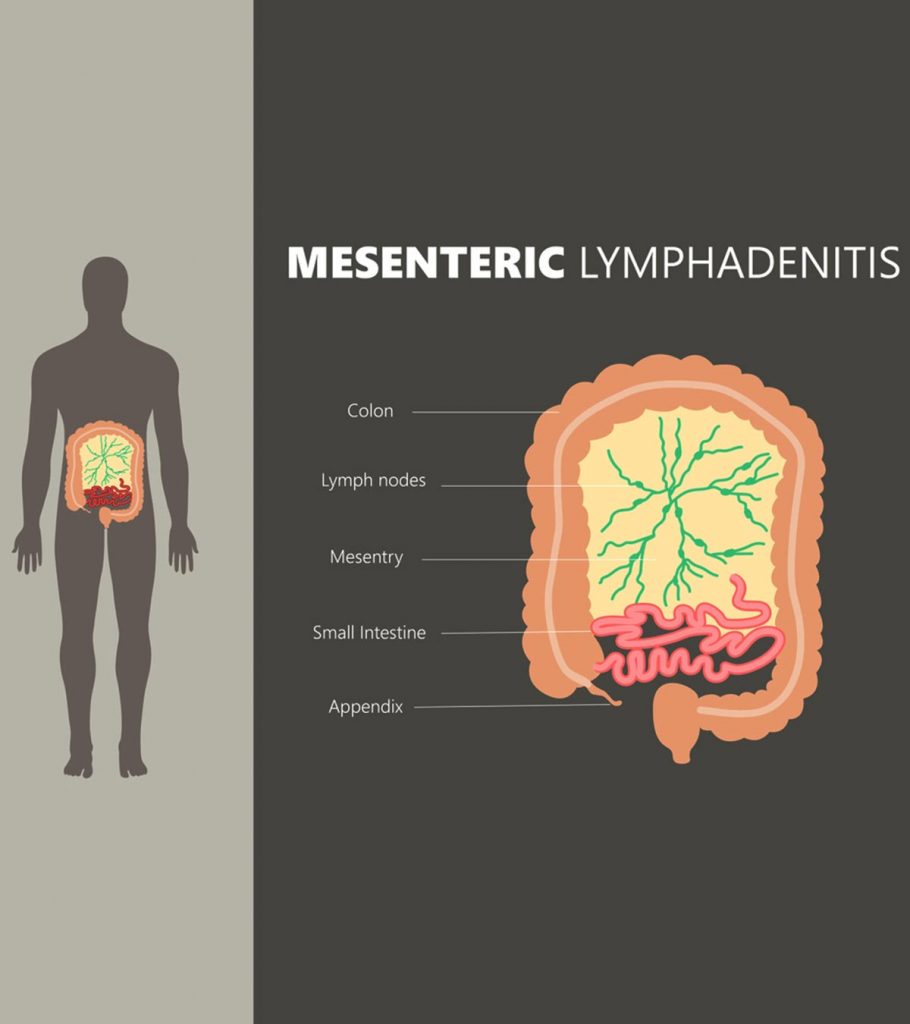Mesenteric lymphadenitis is the inflammation of mesenteric lymph nodes. These are groups of three or more lymph nodes (lymph glands) present in the right lower mesentery. The mesentery is a fold of peritoneum (membrane lining the abdominal cavity) that attaches intestines to the back of the abdominal wall.
Although it can occur at any age, children are more likely to get mesenteric lymphadenitis (1). Seek medical attention if your child has severe abdominal pain since it can be a symptom of conditions that require emergency care.
Read this post to know more about the causes, signs, symptoms, risk factors, complications, diagnosis, treatment, and prevention of mesenteric lymphadenitis in children.
Signs And Symptoms Of Mesenteric Lymphadenitis In Children
Mesenteric lymphadenitis can be chronic or acute inflammation, depending on the microorganism causing it. Signs and symptoms of mesenteric lymphadenitis may include (2):
Widespread lower right quadrant abdominal pain is a common symptom of mesenteric lymphadenitis in most children. The above-mentioned signs and symptoms can also be seen in other diseases and may also vary in mesenteric lymphadenitis, depending on the cause.
Causes Of Mesenteric Lymphadenitis In Children
Viral infections are a major cause of mesenteric lymphadenitis in children. Viral gastrointestinal tract infections, such as stomach flu (viral gastroenteritis), may cause inflammation of the mesenteric lymph nodes.
The following conditions may also cause inflammation of mesenteric lymph nodes (3).
Risk Factors And Complications Of Lymphadenitis In Children
The risk factors for mesenteric lymphadenitis can be similar to the risk factors for bacterial or viral gastroenteritis, such as the consumption of contaminated food and water. Children with diagnosed IBD or lymphoma may also have a high risk of lymphadenitis.
Complications of mesenteric lymphadenitis may include (4):
When To See A Doctor
Abdominal pain is common in children and teens, and it can be hard to know when it requires medical attention. However, if your child has severe, sudden onset of abdominal pain, seek immediate medical care since this can even be the symptom of appendicitis. Abdominal pain with fever, diarrhea, or vomiting also requires medical care to avoid complications (5).
Diagnosis Of Mesenteric Lymphadenitis In Children
Pediatricians will perform a physical examination and also ask about the symptoms and medical history of your child. Depending on the findings from the history and physical exam, they may order blood tests and imaging tests to confirm the diagnosis of mesenteric lymphadenitis (6).
Blood tests could help confirm the presence and type of infection, and imaging tests such as abdominal ultrasound or a CT scan give a visualization of mesenteric lymph nodes.
Lifestyle And Home Remedies For Lymphadenitis
Mild mesenteric adenitis after stomach flu can be managed at home through the following ways (5).
- Adequate rest to enhance recovery
- Warm moist heat application using washcloth over the abdomen may help ease pain and discomfort
Home remedies are enough to treat mild conditions since it is a self-resolving disease. However, seeking expert advice is always helpful to confirm the diagnosis and exclude other causes of abdominal pain in children.
Treatment For Mesenteric Lymphadenitis In Children
Treatment for mesenteric lymphadenitis depends on the underlying cause and severity of the disease. Treatment may include (7):
- Supportive care with adequate hydration.
- Mild and uncomplicated mesenteric lymphadenitis due to viral gastroenteritis can be self-limiting and completely resolves within a month or more.
- Mild cases may not require any specific therapies, and symptoms can be treated by over-the-counter pain and fever medications, such as Tylenol (acetaminophen) and Advil or Motrin (ibuprofen). Aspirin should be avoided since it may cause Reye’s syndrome.
- Complications such as suppuration, abscess, or peritonitis are managed with abdominal surgery (laparotomy) and antibiotics.
Although in many children, mesenteric lymphadenitis can be cured completely without specific management, a few children with severe infection and associated sepsis may require hospitalization and aggressive management. Untreated severe lymphadenitis can be life-threatening in children.
How To Prevent Mesenteric Lymphadenitis In Children?
Preventing bacterial and viral infections helps reduce the risk of mesenteric lymphadenitis in children. The following precautions may help reduce the risk of infectious diseases in children (8).
- Wash hands with soap and water
- Avoid close contact with sick people
- Do not consume contaminated food and water
Timely management of gastrointestinal infections, such as stomach flu, or respiratory infections, could reduce the chance of developing inflammation of the mesenteric lymph nodes.
Although mesenteric lymphadenitis is not a serious disease, it may require emergency care in children since the signs and symptoms may resemble acute abdominal conditions such as appendicitis. Timely treatment can prevent complications, and adequate precautions can help prevent the condition.
